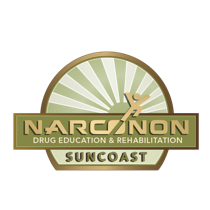We at Suncoast Rehabilitation Center have helped people addicted to many types of drugs. One type of addiction that is becoming more and more common is the addiction to prescription drugs.

There are many different types of prescription drugs which have high potential for addiction, even in medical use. And many of these are also readily available on the street, where all use is abuse.
Here are some examples of addictive prescription medications, grouped by type:
Opiates: Codeine, Morphine, Methadone, Fentanyl, Oxycontin, Oxycodone, Percocet, Hydrocodone, Hydromorphine, Oxymorphone, and more.
These drugs are primarily prescribed or used as pain killers for injuries, operations and similar medical situations. Opiates have more side effects than just tolerance and addiction, however, and if you are prescribed them, you should take some time to research all the side effects for your drug.
For example, opiate use can cause constipation, sedation, euphoria, fatigue, depression, tremors, sleeplessness, anxiety, flue-like symptoms, stomach upsets, hallucination, delirium, muscle and bone pain, respiratory depression, confusion, heart issues, and more. It is important to research all of these factors before taking any medication, and to discuss any concerns you have with your doctor.
Benzodiazepines: Ativan, Halcion, Librium, Valium, and Xanax.
Such drugs are psychoactive agents used to treat conditions such as anxiety, insomnia and convulsions and seizures. The have sedative, hypnotic, anti-anxiety, anti-convulsant, and muscle relaxant properties. Such drugs can also cause decreased metabolism, drowsiness, poor concentration, muscle weakness, vertigo, mental confusion, impaired reaction time, suicidal ideation, depression, memory impairment, etc.
Barbiturates: Amytal, Mebutal, Seconal, and Phenobarbital.
Barbiturates were used medically in the 1960s and 70s to address problems of insomnia, anxiety and seizures. They have since been replaced medically by drugs with less harmful side effects. These drugs lead to tolerance and addiction. Their side effects include dizziness, drowsiness, anxiety, constipation, headache, nausea, insomnia, hallucination, depression, skin rash, ulcers, chest pain, weakness, fever, low body temperature, poor judgment, trouble breathing, and more. Again, if you are concerned about how the drug might interact with your body, or you feel you have a preexisting condition that your doctor may not know about, or if you have been abusing other drugs your doctor does not know about, be sure to talk to your doctor before filling and taking the prescribed medication.
Sleep Medications: Ambiem, Sonata, and Lunesta.
Sleep medications can cause dependence in more ways than one. Not only do such drugs have a high possibility of abuse, insomniacs may become completely dependent upon sleeping pills for a good night’s sleep.
Some of the side effects of using sleep medications are: Sleep-driving, sleep-eating, sleep-walking, etc. There have been reports of someone literally eating a pound of chocolate in their sleep. Another report was of a woman who had turned on her burner to do some sleep-cooking. She was lucky to wake up in time. Additionally, a friend told me that her mother was on a sleep med, and ended up cooking in her sleep at midnight, as well as tried to find her keys so she could drive somewhere – also in her sleep. They had to hide her keys from her. Needless to say, she went to the doctor to get off the drug. She and my friend demanded that the doctor give her alternatives so she could get off drug.
Additional effects are: fuzzy head/hangover, acid reflux, compulsive behaviors including gambling, eating and sexual behaviors, headaches, nervousness, irritability, confusion, depression, vivid dreams/nightmares, palpitations, chest pains, increased heart rate, loss of appetite, nausea, vomiting, diarrhea, constipation, and more.
Amphetamines: Adderall, Ritalin, Biphetamine, and Dexedrine.
Amphetamines are used medically for the treatment of narcolepsy, short term weight loss and for the treatment of so-called hyperactive children (a questionable practice which has led to considerable abuse and has resulted in drugs such as Adderall and Ritalin being nicknamed, ”kiddie cocaine.” These drugs have many side effects including: jitteriness, social withdrawal, loss of appetite, insomnia, fever, elation, euphoria, irritability, nightmares, depression, anorexia, and heart problems. your doctor if you are being prescribed these powerful and addictive drugs.
If you or someone you know is addicted to any prescription medication, legally or illegally, call us today at 877-850-7355. They are putting their lives at risk by abusing such drugs. Just because they are called “prescription medication” does not make them safe nor prevent them from being abused. We can help with addiction to any kind of drug – including prescription meds with our inpatient, drug-free program.
Refs: NIH, Opiates.com, AAFP.org, Mayoclinic.com, FDA.gov, Health.com, RXlist.com, NCBI
